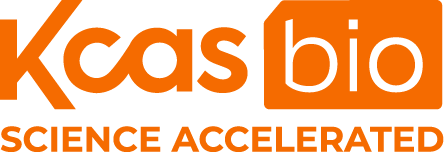In drug development, ultrasensitive bioanalytical platforms are increasingly in demand, especially in neuroscience, where analytes are often present at very low concentrations.
.KCAS Bio addresses this demand with technologies ranging from dedicated platforms to ultra-sensitive kits on conventional systems.
The NULISA™ / Argo™ HT platform is a new, cutting-edge technology with strong potential in ultra-sensitive biomarker detection and targeted proteomics.
In this webinar, the featured speakers will share initial data exploring the use of the NULISA™ / Argo™ HT platform for developing a custom assay kit and evaluating its ability to improve the method sensitivity for a target engagement biomarker, including a comparison with a transferred Simoa® method that proved insufficiently sensitive in CSF and plasma from patients with a rare neurodegenerative disease.
Early results showed that the calibration curve exhibited enhanced sensitivity, and optimized assay conditions further increased detection capability.
Viewers will gain insights into developing, optimizing and applying next-generation ultra-sensitive technology for challenging biomarker detection.
Register now to learn how NULISA™ / Argo™ HT can enhance assay sensitivity and support neurodegenerative drug development.
Speakers

Christine Bain Wendlinger, PhD, Senior Scientific Advisor, KCAS Bio (Lyon)
Christine Bain Wendlinger is an Immunologist by training and has been working for years in the fields of immuno-oncology and persistent viral infections, such as Chronic Hepatitis C, at Biomérieux and Transgene. Before joining in 2011, the company that was acquired by KCAS Bio in 2022, she was coordinating biomarker programs supporting the development of immunotherapeutic products in cancer and infectious diseases at Transgene.
As a Senior Scientific Advisor at KCAS Bio, Christine supports the sales and operations team on scientific and technical aspects related to method development, validation and (pre)clinical sample analysis for pharmacokinetics, immunogenicity and biomarker assays for biologics in immuno-oncology, infectious diseases, inflammatory and autoimmune syndromes and neurological diseases.
She is currently a core member of the European Bioanalysis Forum (EBF) and EIP (European Immunogenicity Platform).

Fabien Lavocat, MSc, Scientist, Bioanalytical Method Development, KCAS Bio (Lyon)
Fabien Lavocat is a Scientist at KCAS Bio in Lyon, specializing in ligand-binding assay (LBA) development for drug and biomarker analysis. With a Master’s degree and 15 years of experience, his career bridges academic research, clinical studies and pharmaceutical R&D, always focused on patient impact. He started in virology, then worked in immunology research on autoimmune diseases, and contributed to a clinical study identifying prognostic markers in ICU patients. At Sanofi, he supported vaccine and biomarker projects. Now at KCAS, he designs tailored bioanalytical methods, combining technical versatility with a collaborative approach to advance translational science.
Who Should Attend?
This webinar will appeal to Scientists in:
- Translational research
- Bioanalysis
- Neurological biomarkers
- Method development
What You Will Learn
Attendees will gain insight into:
- NULISA™ / Argo™ HT capabilities: See how the platform pushes the limits of biomarker sensitivity and applies to challenging biomarker detection scenarios
- Assay optimization: Learn how antibody conjugation, capture/detection ratios and buffer conditions enhance performance
- Biomarker study applications: Examine results from CSF, plasma and extracellular vesicles, highlighting relevance for ALS, Alzheimer’s and translational research
Xtalks Partner
KCAS Bio
KCAS Bio is a leading contract research organization (CRO) employing top scientific talent which provides comprehensive bioanalytical services to the global biopharmaceutical industry from early discovery support through product registration and beyond. KCAS Bio offers bioanalytical, biomarker, immunogenicity, cellular and molecular assay services along with clinical kitting and sample management. KCAS Bio operates in state-of-the-art facilities in the United States and Europe, with the expertise, capacity, and flexibility to support the development of all types of drugs, biologics, cell and gene therapies to improve health worldwide.
You Must Login To Register for this Free Webinar
Already have an account? LOGIN HERE. If you don’t have an account you need to create a free account.
Create Account




